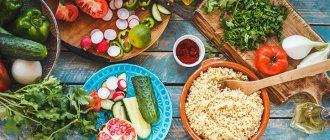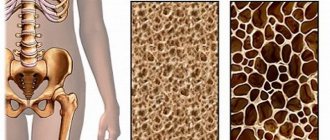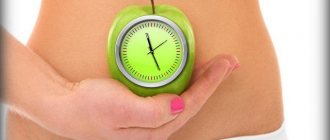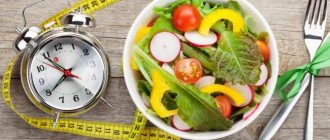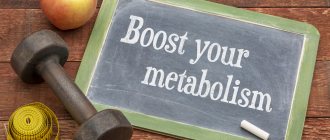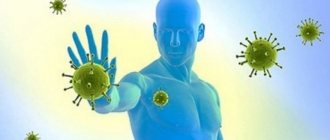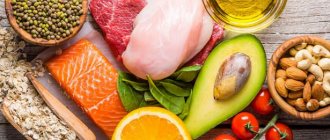Nutrition during menopause
Menopause is an extremely unpleasant but inevitable stage in the life of every woman. Reproductive function gradually fades, accompanied by hormonal changes and often poor health. Hot flashes, headaches, sweating and rapid heartbeat become frequent accompaniments of menopause. Unfortunately, it is impossible to turn back time. But absolutely everyone can make their life as comfortable as possible and reduce the manifestations of unpleasant symptoms. Sometimes all you need to do is make small changes to your diet. What should proper nutrition be like during menopause?
Sports load
Of course, weight loss measures will not be effective during menopause in women without an active lifestyle. To achieve the effect, you need to take classes regularly, at least 2-3 times a week. The duration of one workout is at least 20-25 minutes.
It is allowed to do exercises in several approaches, taking breaks of 5 minutes between them. It's better to exercise outdoors. It is preferable to start with long walks, then add light jogging and therapeutic exercises.
It is important that the increase in load occurs gradually. If the training is intense, long breaks are needed, because the muscles must have time to recover. This does not happen as quickly as at a young age.
An important rule: training should add strength and energy, and not take it away. If you feel worse, overwhelmed, or find it difficult to do the exercises, it is better to change them to another program. Let's present some examples of effective gymnastics exercises for menopause in women:
- Lie on your stomach. Pull it in toward your spine and then push it out. Repeat 25-40 times.
- Lie on your back. Raise your legs up. Hold them, then lower and relax the muscles. Repeat 6-10 times.
- Lean your elbows on the wall, place your feet shoulder-width apart. Squat down, spreading your knees out to the sides, then rise up, tensing the muscles of the perineum, buttocks and thighs. Repeat 8-10 times.
- Sit cross-legged on the floor. Inhale as you raise your arms up and bend back. Then, bending forward, exhale. Return to the starting position. Repeat 5 times.
- Place your feet together and your hands on your waist. Squat down and then rise up onto your toes. Repeat 6-10 times.
This kind of warm-up is especially useful if you do sedentary work for a long time.
Stages of menopause
Menopause does not occur instantly, but develops gradually over several years. To ensure that menopause does not become an unpleasant surprise, women over 40 should pay attention to any changes in the body and do everything possible to avoid many serious diseases caused by hormonal imbalances. There are three stages of menopause:
- Premenopause
. This stage begins approximately 4-5 years before menopause and is characterized by an irreversible decrease in estrogen levels. In this regard, metabolism slows down, irritability and tearfulness appear, and taste preferences change. Menstruation becomes irregular and more scanty than usual, and the first unpleasant symptoms of menopause—hot flashes—appear. - Menopause
. This is the absence of menstruation for a year. It is believed that after this amenorrhea occurs, that is, subsequent natural bleeding is impossible. - Postmenopause
. This is the period from the onset of amenorrhea to the end of life. The deficiency of sex hormones reaches its maximum, and the painful manifestations of menopause decrease. They are replaced by the consequences of hormonal imbalance.
Application of dietary supplement MODELFORM® 40+
The nutritional supplement is intended for body weight correction and figure modeling. The drug was developed with the participation of specialists in the field of healthy nutrition.
The nutritional supplement takes into account the need for vitamins and micronutrients in adulthood. The drug is intended not only to get rid of unwanted pounds, but also to normalize the physiological processes occurring in the body.
After reaching the age of 40, hormonal changes are observed. In the body of a middle-aged woman, the amount of progesterone gradually decreases. This can lead to the appearance of extra pounds and a deterioration in overall health. Other symptoms of menopause include fatigue, hot flashes, and irritability.
The dietary supplement MODELFORM® 40+ reduces the severity of symptoms of hormonal changes in women and increases the overall tone of the body. The product contains the innovative ELEGREENALL complex, additionally enhanced with natural ingredients.
The phytoestrogens present in the formula of the dietary supplement help stabilize the emotional background of a woman. They activate the process of collagen synthesis and prevent the formation of wrinkles.
MODELFORM® 40+ has a mild tonic effect on the body. The drug improves the process of absorption of carbohydrates and fats that enter the body with food. The product activates the process of removing toxic substances from the body and improves metabolism.
The food supplement has a complex effect on the body:
- helps control appetite;
- allows you to get rid of fat deposits in problem areas;
- normalizes lipid and carbohydrate metabolism;
- improves skin condition;
- reduces the severity of symptoms of hormonal imbalance.
Take one capsule of MODELFORM® 40+ in the morning. It is recommended to use the product during meals or after meals. Take the capsules with 0.2 liters of water. The average course duration is two months. If necessary, the course is resumed.
Low Metabolism Diet
A slower metabolism increases the likelihood of rapid weight gain, which only aggravates a woman’s condition and entails a lot of unpleasant consequences. You should think about proper nutrition already at the premenopausal stage. At the same time, we should not forget that fasting and overly strict food restriction are unacceptable. It is also undesirable to adhere to various unbalanced diets, for example, the Dukan diet, which promotes the consumption of protein foods, which can lead to exacerbation of chronic diseases. How should women eat during menopause? In most cases, it is enough to follow a few simple rules:
- Reduce the amount of animal fat consumed
by replacing fatty meats with lean beef, turkey and fish. It is best not to fry meat and fish dishes, but bake them with a little oil or steam them. - Increase your consumption of vegetable fats.
Vegetable oils (olive, sunflower, flaxseed, pumpkin, grape seed oil), as well as nuts, bran and seeds should be present on the table every day. - Include complex carbohydrates in your diet.
Whole grain porridges, fresh vegetables and fruits should be the main base in the menu of a woman during menopause.
A number of foods consumed during menopause should be limited:
- fatty cheeses;
- eggs (you can eat one boiled egg per week);
- rich pastries.
Foods eaten during menopause should be not only tasty, but also healthy. Therefore, the following are strictly prohibited:
- white sugar (it should be replaced with cane sugar or honey);
- carbonated drinks;
- sausages, canned food and fast food.
Don’t forget the basics of proper nutrition: you need to eat often, but little by little.
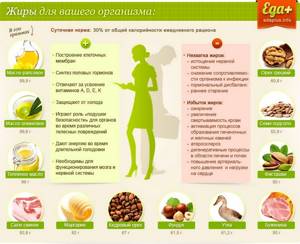
General rules
Menopause (menopause) is a physiological period of a woman’s life, accompanied by involutional processes of the reproductive system, caused by the aging of the body and occurring in conditions of deficiency of sex hormones. For most women, their decline begins after 37-40 years and accelerates after 45 years. Within the climacteric period, along with menopause, there are several stages: the period of menopausal transition, perimenopause and postmenopause. At the same time, a significant proportion of women in the menopausal period develop climacteric syndrome , which is a pathological condition characterized by a complex of vegetative-vascular, neuropsychic and metabolic-trophic disorders.
Pathogenetically, these disorders are similar to the signs of estrogen deficiency syndrome and are manifested by atrophy of the mucous membrane of the reproductive tract, menstrual irregularities, weight gain, sudden attacks of redness of the skin and sweating, sudden changes in mood, depression, memory impairment, sleep disturbances, lack of energy, headaches , instability blood pressure , deterioration of skin and hair condition, dysuria , decreased libido and performance, and in a later period - osteoporosis and dysfunction of the cardiovascular system, which negatively affects the quality of life of women.
The main method of correction/prevention of menopausal disorders is hormone replacement therapy with various analogues of female sex hormones. Nutrition during menopause in women is also an essential component in the prevention of various disorders during menopause, which is due to a slowdown in metabolism and an increased risk of weight gain. Nutrition correction must begin already at the premenopausal stage, and during this period, strict food restriction/use of various unbalanced diets is unacceptable, and fasting is especially unacceptable.
As such, there is no diet for women during menopause, since nutrition during this period must be individualized depending on a number of factors: the presence of excess weight, metabolic rate, immunity , bone mass and muscle tone, the presence of disorders associated with menopause (joint and muscle pain, obesity , arterial hypertension , diabetes , osteoporosis and others). The main principle of women's nutrition during this period is to balance the daily diet with basic food nutrients with the correction of fat and carbohydrate components and saturate the diet with foods containing a wide range of vitamins and microelements.
If a woman experiences an increase in body weight during this period, a diet with reduced calories is necessary. To lose weight during menopause, food should not just be low-calorie, but allow the formation of a negative energy balance, that is, the calorie content of the diet should be less than or equal to the level of actual energy consumption per day when trying to lose weight or maintain a constant weight. The rule of thumb for losing weight is the need to reduce the calorie content of your diet by an average of 20% of your energy expenditure. For safe weight loss, body weight loss should not exceed 200-300 g/week, and the calorie content of the diet should not be lower than 1500 kcal/day.
Calorie reduction is achieved by reducing the consumption of animal fats and simple carbohydrates. The protein quota is not subject to restrictions. The consumption of saturated fats is limited/excluded - fatty red meat, meat by-products, sausages, solid fats (bacon, lard), canned food, smoked meats, fast food products, duck/goose meat, high-fat dairy products.
At the same time, the consumption of vegetable fats is not limited and, moreover, their presence in the diet is mandatory (cold-pressed vegetable oils, seeds, nuts). From animal fats, it is necessary to consume fish oil, which is found in large quantities in fish (herring, salmon, mackerel, tuna) and milk fats.
Restrictions also apply to simple carbohydrates - sweets, sugar, jams, cakes, preserves, pastries, pastries. Without restrictions, within normal limits, foods containing complex carbohydrates that contain a lot of fiber and vitamins (whole grain cereals, vegetables) are consumed, and it is recommended to reduce the consumption of white rice and pasta. Vegetables should be consumed both raw and cooked.
Preference should be given to carrots, pumpkin, onions, zucchini, beets, sweet peppers, lettuce, asparagus, cauliflower, garden greens, baked potatoes, and tomatoes. From fruits - citrus fruits, sour varieties of berries/fruits. No less important is the consumption of free liquid at a level of 1.5-2. l/day in the form of freshly prepared juices, herbal teas, green tea, still mineral waters, rosehip decoction. At the same time, the consumption of cocoa, black tea, coffee and alcohol-containing drinks should be limited to a minimum. If you are prone to hypertension, you should limit your salt intake, replacing it with herbs and seasonings that will give food a new taste.
Nutrition during menopause should also include phytoestrogens, the consumption of which in sufficient quantities can correct hot flashes. These are, first of all, isoflavones ( ginestein , daidzein ), which are found in sufficient quantities in legumes (soybeans, peas, beans); lignins , present in bran, oilseeds (flax seeds), whole grains, vegetables, legumes and fruits. Therefore, it is recommended to include flax seeds (40 g of seeds/day), soy products (beans, tofu, soy sauce), peas, and beans in the diet.
Antioxidants have a positive effect on a number of organs/systems , among which it is necessary to highlight resveratrol , contained in mulberries, skins/seeds of red grapes, peanuts, and sprouted beans. Resveratrol is one of the most powerful natural antioxidants; its effect is 5 times b-carotene vitamin C by 20 times, vitamin E by 50 times, and coenzyme Q10 by 17 times. Its effect has been proven in slowing down the aging process of cells and increasing their life expectancy, strengthens bone tissue, prevents the oxidation of low-density lipoproteins, and has an anti-inflammatory, neuroprotective effect.
To improve bone metabolism, it is extremely important to promptly replenish calcium and vitamin D and K . Clinical trials have found that adequate daily intake of calcium and vitamin D reduces bone loss and, accordingly, reduces the risk of osteoporosis and fractures. The recommended intake of vitamin D for premenopausal women is 400 IU and 800 IU for those over 50 years of age. Getting enough calcium in your diet is important to maintain bone mineral density.
The daily calcium intake for women during menopause is 1200–1500 mg. Equally important is to provide the woman’s body with vitamins B, C, A, E, PP, folic acid and microelements - iron, magnesium, potassium, selenium. If it is not possible to satisfy the daily need for vitamins and minerals through food, it is recommended to take an additional supplement as an independent drug - dietary supplements, complex vitamin-mineral products developed specifically for women during menopause: Menoril Plus , Inoclim , Qi-Clim for women 45+, Menoactive , Active Menopause , CX/X-Ex , Lady's formula Woman 40+, One A Day , Stop Klimaks and others.
Getting rid of hot flashes
One of the most unpleasant manifestations of menopause is hot flashes. A sharp feeling of heat, redness of the face and neck, sweating can be noticeable to others, which gives the woman a lot of anxiety. However, getting rid of hot flashes or reducing the frequency of their occurrence is not difficult. To do this, it is enough to eat sea fish, lettuce, nuts and seaweed several times a week. Compliance with the correct drinking regime also plays an important role, for which you should:
- reduce the consumption of coffee, black tea, cocoa and alcohol to a minimum;
- drink a lot of clean, non-carbonated drinking water (in particular, it is very useful to drink a glass of water with a slice of lemon on an empty stomach every morning);
- give preference to herbal tea.
It is useful to make it a rule to drink herbal decoctions at least once a day: passionflower, mistletoe, shepherd's purse, oregano, sage. This will help regulate hormones, relieve anxiety, and get rid of insomnia and stress.
What are the dangers of poor nutrition?
After 45 years, women often experience menopausal metabolic syndrome, which is expressed in rapid weight gain, obesity in the abdomen and neck. Therefore, it is especially important to monitor the level of calories consumed, the amount of simple sugars and fast carbohydrates, which most contribute to weight gain. This includes sweets, soda, white bread, baked goods, and also fast food.
Many women strive to lose weight during menopause; read more about this in a separate article on our website.
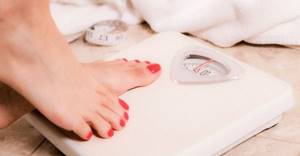
After 50 years, nutrition during menopause requires extreme control, since there is a risk of atherosclerosis (artery disease in which cholesterol is deposited on the walls of blood vessels). Fatty meats and fried foods increase cholesterol and triglyceride levels in the blood. Nuts and red fish, on the contrary, can reduce cholesterol levels by up to 10% when consumed regularly. However, nuts are quite fatty; you should not eat more than 30 g of them per day. Fish should be present in the diet about three times a week.
Disease Prevention
Unfortunately, age-related changes lead to an exacerbation of most chronic health problems. In addition, very often menopause can become an impetus for the development of the following diseases:
- Hypertension.
You should not bring yourself to such a state that requires treatment with serious drugs. To begin with, you should sharply limit your salt intake. You can replace it with herbs and spices: basil, dill, mustard greens, rosemary. It is allowed to salt food with a small amount of iodized sea salt. - Vision problems.
More than 70% of women suffer from myopia and senile farsightedness. To avoid these problems for as long as possible, you need to eat seafood more often: shrimp, mussels, squid. - Osteoporosis.
Estrogen deficiency inevitably leads to calcium leaching from bones, making them more porous and brittle. Osteoporosis is especially dangerous for women after 50, since it is at this age that the risk of hip fracture increases. To prevent this from happening, you need to eat calcium-rich foods every day: low-fat hard cheese, kefir, cottage cheese, fermented baked milk, medium-fat milk. - Oncology.
The risk of breast cancer increases several times during menopause. Recent studies have shown that Asian women are less susceptible to this disease because they eat healthy soy-based foods, particularly tofu. Currently, you can buy this unusual and very tasty product in almost any store.
Foods that should be limited
Women over 50 years of age are advised to abstain from certain foods to reduce the symptoms of menopause and the risk of developing menopausal complications. After 50-55 years, the intake of the following products should be limited:
- alcoholic drinks, which constrict blood vessels and provoke hot flashes;
- smoked meats: an excessive amount of refractory fat leads to an increase in the concentration of bad cholesterol, the formation of plaques, blockage of the lumen of blood vessels with the subsequent development of atherosclerosis;
- strong tea and coffee, which negatively affect the state of the nervous system, cause increased irritability and anxiety;
- sugar, simple carbohydrates;
- semi-finished products containing large amounts of trans fats;
- white bread, pastries, cakes, pastries;
- fatty industrial sauces: mayonnaise.
It is also recommended to refrain from eating excessively salty foods, which provoke swelling and hypertension. Fluctuations in hormonal levels often lead to taste disturbances and consumption of excessively sweet or salty foods.
Doctors recommend completely eliminating any product only in extreme situations. Limiting their use to a minimum amount is often sufficient.
Examples of menus for older women
What dishes should you prepare according to the recommended diet? You can eat a lot of different foods during menopause. Sample menu for the week:
Breakfast:
- muesli with yogurt and berries;
- oatmeal with honey and raisins;
- cottage cheese with sour cream and prunes;
- steamed cheesecakes with berry sauce;
- rice casserole with vegetables;
- pumpkin pancakes with apple and cinnamon;
- whole grain bread croutons.
Dinner:
- lean cabbage soup with a small piece of beef;
- spicy tomato and bell pepper soup;
- pumpkin puree soup with pumpkin seeds and garlic croutons;
- lean fish soup with salmon;
- vegetable soup with turkey meatballs;
- onion soup with a slice of whole grain bread;
- cold vegetable okroshka.
Snacks:
- granola - a dish of fried oatmeal with dried fruits and honey;
- kefir with flax seeds and blueberries;
- fruit puree;
- baked apple with cottage cheese;
- fruit salad with yogurt or sour cream;
- homemade banana ice cream with a little cocoa and yogurt;
- Ryazhenka with prunes.
Dinner:
- boiled rice with seafood and cream sauce;
- mashed potatoes with lean meat cutlets;
- stewed vegetables with steamed fish;
- potato casserole with carrot cutlets;
- pasta with chicken or beef meatballs;
- cabbage rolls with sour cream;
- vegetable stew with a piece of chicken baked in spices.
As you can see, nutrition during menopause can be not only healthy, but also very tasty.
Drug therapy
Is Reduxin prescribed for menopause? This is a drug for weight loss. Its active ingredient is sibutramine. The drug is taken only for alimentary obesity with a BMI of 30 kg/m2 or more. And also with excess body weight complicated by serious diseases. For example, diabetes.
If the weight increase is not so significant, then the woman is prescribed hormonal medications aimed, accordingly, at replenishing the missing estrogens and progesterones.
As an example, we list the following tools:
- "Klimonorm". The active components are gestagen and estrogen. Prescribed for changes in skin condition, genitourinary problems, and depression.
- "Ovestin". The active ingredient is estriol. The product helps restore normal microflora, epithelium of the vagina, cervix, vulva, urethra.
- "Estrofem". The main component is estradiol. The drug was created to eliminate menopausal symptoms and has a beneficial effect on the condition of bones.
It is possible not to gain weight during menopause. But for this you need to adjust your lifestyle: turn to a healthy diet, be more active, give up junk food.
Menopause is not synonymous with old age
Unfortunately, many women perceive menopause as the beginning of old age and the end of life. In fact, menopause is just another life stage that can be enriched with interesting events and pleasant moments. Moreover, this stage of life can be the beginning of something new. To look great and have the strength to realize your wildest ideas, diet alone may not be enough. It is necessary to take care of your well-being, regularly visit doctors and follow the rules that are well known to everyone, but so often forgotten by us:
- quit smoking;
- do physical exercise, such as yoga or gymnastics;
- walk more and ventilate the apartment often;
- take vitamins;
- avoid stress.
And the main thing is to remember: absolutely any woman can be healthy and happy, regardless of age and hormone levels!
Read
Also:
- Calculate body mass index for women
- How to treat hot flashes during menopause
- Discharge in women during menopause: normal or need to see a doctor
- Fitness for women after 50 years
- What vitamins to take during menopause for women
- Diets and proper nutrition when planning pregnancy for women
Essential vitamins and minerals in your daily diet
The basic rule of nutrition during menopause is to eat food rich in vitamins and minerals. A diet enriched with microelements and vitamins improves metabolism, which reduces the risk of obesity. During this period, the composition of foods is very important, but in addition to basic nutrition, it is recommended to additionally take multivitamin complexes, for example: Lady's formula Menopause. It is also recommended to take pantohematogen. This is a drug that contains antlers (young deer antlers). Altai deer antlers normalize hormonal levels in women during menopause, improve the condition of bone tissue, and strengthen the immune system.
Vitamins and minerals that are important during menopause:
Calcium and boron
Calcium is essential to prevent osteoporosis. Provides strength to bone tissue, and is also important for the functioning of the nervous system and myocardium. Prevents joint pain, weakening of the spine, and helps strengthen tooth enamel. Boron helps retain calcium in the body, which helps reduce bone fragility.
Calcium is found: in dairy products; in almonds; in soybeans; in all varieties of fish; in broccoli; in avocado. Boron is present: in asparagus; in prunes; in strawberries; in peaches.
Magnesium
This mineral has a beneficial effect on the nervous system. Helps cope with insomnia during menopause. Has a calming and mild sedative effect.
Magnesium is found in the following foods: nuts (cashews, almonds, pistachios, peanuts, hazelnuts, pine nuts and walnuts); in cereals (buckwheat, barley, oatmeal, wheat); in legumes (peas, beans, soybeans).
Omega 3
These are polyunsaturated fatty acids that help the heart function, prevent fragility of hair during menopause, nails, and also prevent neurological diseases and help reduce inflammatory processes.
Omega 3 is found in vegetable fats and fish oils. The highest content of this acid is found in: Atlantic salmon; in sardines; in trout; in tuna and shrimp.
Permitted and prohibited products
The only way to guarantee weight loss during menopause for most women is proper nutrition. A diet for menopause involves a balanced, healthy diet.
Only a diet rich in vitamins and minerals saves from premature aging of the skin and the development of age-related diseases, helps maintain slimness and improves well-being, and also reduces menopausal symptoms and speeds up metabolism.
If you stick to this diet, you can easily lose weight at home. Healthy diet During menopause, be sure to include the following products in your menu:
- lean meat (beef, chicken, turkey, rabbit);
- low-fat dairy products (kefir, cottage cheese, fermented baked milk, yogurt);
- cereals and cereals of all types, bran;
- vegetables and herbs;
- fruits and berries;
- dried fruits, nuts, seeds;
- natural juices, herbal teas;
- fish and vegetable oils;
- onion and garlic;
- beans.
Preference should be given to dishes prepared in the oven, steamer, boiling or stewing. But frying should be avoided. Harmful foods Minimize or completely avoid consuming the following list of foods:
- fat meat;
- fast food and other semi-finished products;
- cakes, pastries, chocolate;
- sausage, frankfurters;
- smoked meats and canned food;
- spicy and unnatural sauces;
- margarine and vegetable spread;
- sweet soda and juices in boxes;
- coffee;
- alcohol.
Source: aveslim.ru
Best Foods for Menopause

To prolong youth during menopause, choose healthy products:
• soy milk and tofu; • pumpkin seeds, flaxseed; • fatty fish: salmon, sardines; • vegetables; • olive, sunflower and linseed oil; • fruits; • whole grain cereals, pasta, bran bread and rice; • nuts; • legumes (beans and lentils); • eggs, fish and lean meats; • green tea, rosehip decoction, unsweetened dried fruit compotes, herbal infusions; • artesian water.
Sometimes you can allow yourself something “unhealthy”.
Why do women gain weight during menopause?
Weight gain during menopause is associated with three reasons:
- Hormonal changes. At the age of 45 to 50 years, the level of estrogen, responsible for the general tone and metabolic processes in the female body, decreases. This entails hormonal changes. Metabolism involuntarily deteriorates. This means that only a third of the food you eat will now be converted into energy. The rest goes to fat reserves.
- An attempt to stabilize hormonal levels. Since a decrease in estrogen levels is an unexpected and stressful phenomenon for the body, against the background of a failure, it begins to look for an opportunity to obtain these hormones in other ways. And since fatty tissue can also produce estrogens, the body accumulates this in an attempt to balance the hormonal system. You end up with extra pounds and weight gain. That is why sometimes during this period some women can lose weight with the help of hormones selected by a specialist.
- Overeating due to stress. During menopause, women often experience hormonal mood swings. They either fall into depression, then withdraw into themselves, or become incredibly apathetic, depriving themselves of walks and other physical activity. In addition, ladies often eat up their worries with a large amount of sweets and other junk food. Hello there, overweight.
Source: aveslim.ru
Additional weight loss products
Ginger tea
It is considered an excellent tool for preventing the gain of extra pounds. It perfectly tones the body, helps activate metabolism, and energizes. You can add ginger to your usual tea and enjoy the drink.
Cabbage juice
This is an excellent means for cleansing the body, removing waste and toxins from it, normalizing the functioning of the intestinal tract, and indeed digestion in general. Weight loss is also attributed to this drink.
Celery juice
Celery is classified as a so-called negative calorie food. It is optimal to prepare salads from fresh celery, and fresh celery juice has an even greater effect on weight loss.
A mixture of pineapple and grapefruit juices
This “explosive” mixture is considered a wonderful fat-burning agent. But it’s better not to drink freshly squeezed juices on an empty stomach. This is especially true for those who suffer from high acidity of gastric juice.
Infusion of cherries and linden flowers
It is prepared simply: mix linden blossom and cherries in a ratio of 1x1, 2 tsp. pour 250 ml of boiling water over the mixture, let stand for 2 hours. and drink two or three times during the day.
How not to make the situation worse? The main prohibitions of menopausal age
Age-related changes dictate new conditions for life, and how quickly a woman accepts them depends on whether she can adapt to the situation and not gain weight. What can you do to maintain an attractive appearance and a slim figure without much effort? Menopause, one way or another, imposes certain prohibitions that only yesterday seemed quite acceptable. So, what should ladies of Balzac’s age give up?
No strict diets or fasting!
Young girls, in order to radically lose weight, can afford to go on any (of course, reasonable and balanced!) diets, even the most strict and debilitating ones. During menopause, such a diet can become disastrous - of course, you will not recover if you completely give up food, and perhaps even lose a few kilograms, but as soon as you allow yourself to relax, the lost weight will return twice as much.
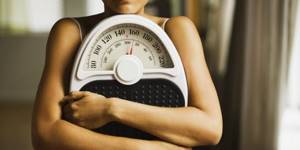
The fact is that during menopause, the female body works completely differently: at the slightest lack of calories, protective mechanisms are activated, and the metabolism literally stops, carefully preserving every fat cell. Moreover, it is almost impossible to awaken it after a diet, forcing it to work in normal mode, which means that it is only possible to not gain weight in this way temporarily.
In addition, insufficient intake of fats from food leads to an even greater decrease in hormonal levels, because estrogens are synthesized precisely from cholesterol. As a result, the symptoms of menopause will only intensify, which will further complicate the current situation.
Physical exercises - only under the supervision of a trainer!
Physical activity helps prevent weight gain, including during menopause - no one argues with this. However, ignoring your own age, working “to the max” is ineffective and, moreover, extremely dangerous! Even with excellent physical fitness and regular exercise in the gym, during menopause it is better to keep exhausting workouts under control, carefully considering a weight loss program. And if sport has appeared in your life quite recently, you should be doubly attentive to your feelings - the body is already experiencing serious stress, so you shouldn’t overload it too much.

However, this does not mean that you should completely remove sports from your life and turn on the “energy saving” mode! During menopause, it is better to switch from serious exercise to more gentle ones, for example, fitness, swimming, water aerobics. By carefully thinking through the program and coordinating it with your doctor and trainer, you can not only not gain weight, but also lose a couple of extra pounds, make your silhouette more toned and neat. However, remember: moderation is good in everything!
Don't panic!
Very often, mature women perceive menopause and the changes associated with it as the end of life. Of course, some “innovations” are irreversible, but most of them live only in the subconscious. With the exception of reproductive function, menopause changes absolutely nothing! Having accepted and understood her new status, it will be much easier for a woman to cope with stress without resorting to standard methods of struggle - “eating” on sweets, depression and melancholy. The best solution will be to adapt to the new conditions that menopause “dictates” and step-by-step solutions to existing problems.

